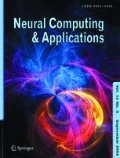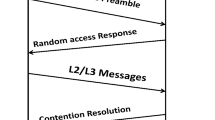Abstract
Quality of service (QoS) implementation in a wireless local area network (WLAN) enables the prediction of network performance and utilization of effective bandwidth for multimedia applications. In QoS-supported WLAN, enhanced distributed channel access (EDCA) adjusts back-off parameters to implement priority-based channel access at the medium access control (MAC) layer. Although conventional QoS-supported EDCA in WLANs can provide a certain degree of QoS guarantee, the performance of best effort data (low-priority) traffic is sacrificed owing to the blind use of a binary exponential back-off (BEB) mechanism for collision avoidance among WLAN stations (STAs). In EDCA, the BEB mechanism exponentially increases the contention window (CW[AC]) for any specific priority access category (AC) when collision occurs and resets it to its initial size after successful data transmission. This increase and reset of CW[AC] is performed regardless of the network density inference, i.e., a scarce WLAN does not require an unnecessary exponential increase in CW[AC]. Similarly, a dense WLAN causes more collisions if CW[AC] is reset to its initial minimum size. Machine-learning algorithms can scrutinize an STA’s experience for WLAN inference. Therefore, in this study, we propose a machine-learning-enabled EDCA (MEDCA) mechanism for QoS-supported MAC layer channel access in dense WLANs. This mechanism utilizes a Q-learning algorithm, which is one of the prevailing models of machine learning, to infer the network density and adjust its back-off CW[AC] accordingly. Simulation results show that MEDCA performs better as compared to the conventional EDCA mechanism in QoS-supported dense WLANs.









Similar content being viewed by others
References
Ali R, Kim SW, Kim B-S, Park Y (2016) Design of MAC layer resource allocation schemes for IEEE 802.11ax: future directions. IETE Techn Rev 35(1):28–56. https://doi.org/10.1080/02564602.2016.1242387
Alpaydm E (2014) Introduction to machine learning, 3rd edn. The MIT Press, Cambridge
Challita U, Dong L, Saad W (2017) Proactive resource management in LTE-U systems: a deep learning perspective. arXiv:1702.07031. Accessed on 20 Dec 2018
Sutton RS, Barto AG (1998) Reinforcement learning: an introduction, 2nd edn. MIT Press, Cambridge
Afzal MK, Kim B, Kim SW (2014) A leader-based reliable multicast MAC protocol for multimedia applications. KSII Trans Internet Inf Syst 8(1):183–195. https://doi.org/10.1007/978-3-642-34883-9_9
Shahin N, Ali R, Kim SW, Kim Y (2019) Cognitive backoff mechanism for IEEE802.11ax high-efficiency WLANs. KICS J Commun Netw 21(2):158–167. https://doi.org/10.1109/JCN.2019.000022
Zhu H, Li M, Chlamtac I, Prabhakaran B (2004) A survey of quality of service in IEEE 802.11 networks. IEEE Wirel Commun 11(4):6–14. https://doi.org/10.1109/MWC.2004.1325887
Ni Q, Romdhani L, Turletti T (2004) A survey of QoS enhancements for IEEE 802.11 wireless LAN. J Wirel Commun Mobile Comput 4:1–20. https://doi.org/10.1002/wcm.196
Romdhani L, Ni Q, Turletti T (2003) Adaptive EDCF: enhanced service differentiation for IEEE 802.11 wireless ad-hoc networks. IEEE Wireless Communications and Networking (WCNC 2003). New Orleans, LA, USA 2:1373–1378. https://doi.org/10.1109/WCNC.2003.1200574
Wang C, Li B, Li L (2004) A new collision resolution mechanism to enhance the performance of IEEE 802.11 DCF. IEEE Trans Veh Technol 53(4):1235–1246. https://doi.org/10.1109/TVT.2004.830951
Zhu H, Cao G, Yener A, Mathias AD (2004) EDCF-DM: a novel enhanced distributed coordination function for wireless ad hoc networks. In: IEEE international conference on communications, Paris, France, vol 7, pp 3886–3890. https://doi.org/10.1109/ICC.2004.1313280
Kwon Y, Fang Y, Latchman H (2003) A novel MAC protocol with fast collision resolution for wireless LANs. In: IEEE INFOCOM 2003, vol 2, San Francisco, CA, pp 853–862. https://doi.org/10.1109/INFCOM.2003.1208923
Malli M, Ni Q, Turletti T, Barakat C (2004) Adaptive fair channel allocation for QoS enhancement in IEEE 802.11 wireless LANs. In: IEEE international conference on communications (IEEE ICC), Paris, France, vol 6, pp 3470–3475. https://doi.org/10.1109/ICC.2004.1313189
Ali R, Shahin N, Kim Y, Kim B, Kim SW (2018) Channel observation-based scaled backoff mechanism for high-efficiency WLANs. IET Electron Lett 54(10):663–665. https://doi.org/10.1049/el.2018.0617
Ali R, Shahin N, Bajracharya R, Kim B, Kim SW (2018) A self-scrutinized backoff mechanism for IEEE 802.11ax in 5G unlicensed networks. Sustainability 10(4):1–15. https://doi.org/10.3390/su10041201
The Network Simulator—ns-3. Available: https://www.nsnam.org/. Accessed on 10 Jan 2019
Even-Dar E, Mansour Y (2003) Learning rates for Q-learning. J Mach Learn Res 5:1–25
Acknowledgements
This work was supported by the 2019 Yeungnam University Research Grant.
Author information
Authors and Affiliations
Corresponding author
Ethics declarations
Conflict of interest
The authors declare that they have no conflict of interest.
Additional information
Publisher's Note
Springer Nature remains neutral with regard to jurisdictional claims in published maps and institutional affiliations.
Rights and permissions
About this article
Cite this article
Ali, R., Nauman, A., Zikria, Y.B. et al. Performance optimization of QoS-supported dense WLANs using machine-learning-enabled enhanced distributed channel access (MEDCA) mechanism. Neural Comput & Applic 32, 13107–13115 (2020). https://doi.org/10.1007/s00521-019-04416-1
Received:
Accepted:
Published:
Issue Date:
DOI: https://doi.org/10.1007/s00521-019-04416-1




